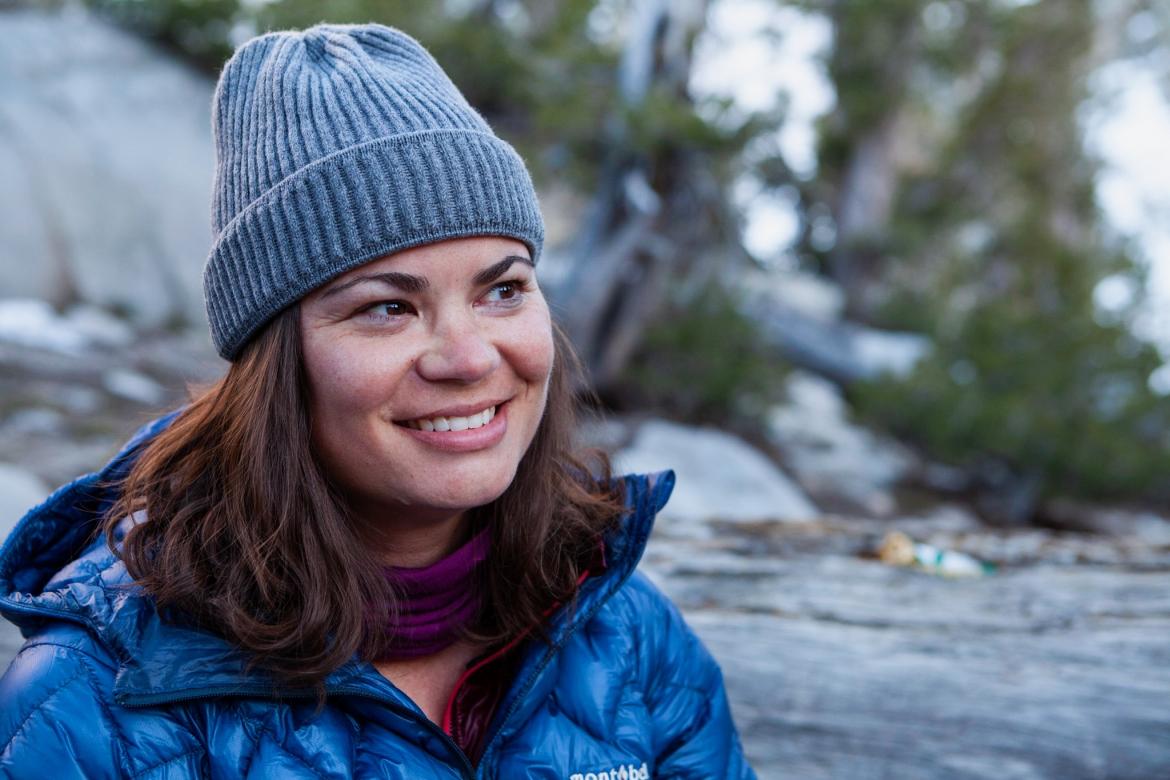
Sierra Club Angeles Chapter volunteer Shawnté Salabert in the mountains
"I love watching for the 'aha!' moments that people experience outdoors," says Sierra Club volunteer Shawnté Salabert, describing that special instant when a person can identify a flower, use new gear, or navigate their way around a lake with nothing more than a map and compass. "But it's especially poignant," she adds, "to witness those times when the aha moment is a little more internal, when something clicks inside that says, 'I belong here.'"
Occasions like these may be small, but they powerfully illustrate the value of the outdoor equity movement, which aims to ensure that all people have opportunities to explore and enjoy nature. It's a cause that Shawnté has championed for years in multiple capacities. As a freelance writer, she's profiled dozens of movement leaders to shine a light on the work they're doing to draw more people outside, honor cultural and community connections to the natural world, and expand the very definition of what it means to be "outdoors." As a trip leader with the Sierra Club's Angeles Chapter, she's led many people on formative wilderness experiences and helped some to become leaders themselves. She also serves as the volunteer co-leader of the Outdoors Theory of Change, a project to unify the Sierra Club's outdoor programs around a common vision of outdoor access for all and to better connect the organization's outdoor and conservation work. As her staff co-leader, Jackie Ostfeld, proclaims, "Shawnté inspires so many on the trail, in the backcountry, and through her deeply passionate writings."
Shawnté's commitment to the cause stems directly from her own childhood. Growing up in an urban neighborhood, she had limited opportunities to experience nature. That changed, however, after an overnight trip to a summer camp run by the Boys & Girls Clubs of America, which sparked a desire to deepen this newfound relationship with the outdoors. "I used to dream about becoming a park ranger," she recalls. "I wanted nothing more than to spend all day in nature, helping other people find their own connection to the places that brought joy, growth, balance, and peace to my own life." As she got older, life took her on a few different paths: school social worker, photographer's assistant, music industry professional, and ultimately, a freelance writer focused on how humans connect with the natural world. When she became involved with the Sierra Club's outdoor programs, she felt as though she had come full circle to those earliest dreams.
"When I lead outings, I'm able to help others access the outdoors in ways they might not have felt comfortable doing on their own."
Shawnté had supported the Sierra Club with donations for many years and attended a few local outings in Los Angeles, but her deep involvement began when she took the Angeles Chapter's Wilderness Travel Course (WTC) in 2014. The 10-week outdoor skills class covered everything from Leave No Trace principles to navigation with map and compass and included four very different field trips across the state. "I was hooked almost immediately," she says. "And once finished with class, I wanted to give back in the hopes of helping others experience that same magic." She began volunteering as a WTC instructor, earned her leadership rating, and organized trips in the Santa Monica Mountains National Recreation Area and Joshua Tree and Sequoia National Parks. She now leads trips throughout the year, including a mixture of backpacking and day hikes as well as one or two "stair hikes" for an urban hiking series held across Los Angeles. "I've been grateful to participate in day hikes and backpacking trips that others have led, as well, each time deepening my connection to the Sierra Club—and to the landscapes we strive to explore, enjoy, and protect."
As both an instructor and a trip leader, Shawnté has a knack for inspiring confidence and skill development in the outdoors. "When I lead outings, I'm able to help others access the outdoors in ways they might not have felt comfortable doing on their own, especially during backpacking trips. We talk about how we feel, what we're thinking, how we're affected by these places." She reveals that her favorite trick is to weave personal growth opportunities into the "hard skills" discussions, such as how to poop outdoors, filter water, or choose an appropriate campsite. "Watching other people process their connections to the land helps deepen my own, and I'm so grateful for this opportunity."
Sometimes these lessons manifest themselves in surprising ways. On a recent trip, when a participant injured her shoulder, the group immediately pulled together to support the participant and safely evacuate her to medical care. Afterward, another member of the group mentioned that being able to assist in the evacuation made him feel helpful and showed him that he has what it takes to stay calm in a difficult situation. The injured participant later sent the group a note, saying, "My faith in people and their willingness to care for others—including new friends and total strangers—was renewed."
Outside of her busy volunteer roles with the Sierra Club, Shawnté has published a book, Hiking the Pacific Crest Trail: Southern California, based on two years researching, hiking, and photographing this legendary path spanning the western United States and Canada. "I know a lot about the Pacific Crest Trail and its associated flora, fauna, geology, and cultural history," she says. "Being able to spend days, weeks, and even months on trail, uninterrupted, is one of the most fantastic things I've experienced in my entire life." Read about Shawnté's adventures and purchase a copy of her book at shawntesalabert.com.
